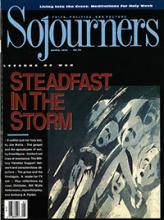The suffering caused by the war in the Gulf is not limited to people in the Middle East, or those with families in the war zone. All around the world, the war's fallout has damaged those working for human rights and freedom.
In some cases, the connection is direct and jarring. For example, President Bush chose January 15 -- the deadline day before the bombing of Baghdad began -- to announce that the United States was releasing funds to support the military government of El Salvador. Six days later, 15 people were massacred by a Salvadoran death squad in a town north of San Salvador.
"The release of aid gave a signal to the death squads and the military that human rights abuses can continue with impunity," said Scott Wright of the Washington, DC-based organization EPICA (Ecumenical Program for Interamerican Communication and Action). Many Central America activists are convinced that the timing was intentional. "They were clearly taking advantage of their ability to control what people hear," said Jennifer Casolo, an American human rights worker who was briefly imprisoned in El Salvador last year for her human rights work. "They chose the day they knew they would get the least press possible."
The Soviet government made similar use of the distraction of the Gulf war when it chose to invade Lithuania on January 13. The presidents of the three Baltic states (and Russian Republic president Boris Yeltsin) issued a plea earlier that week to the United States government, urging a delay in starting the war against Iraq. War in the Gulf, they said, would divert attention from their struggle for independence, and make a Soviet crackdown more likely. Their worries were proved well-grounded when days later Soviet tanks rolled into Lithuania to crush the freedom movement, killing 14 people and injuring more than 100.
Read the Full Article
